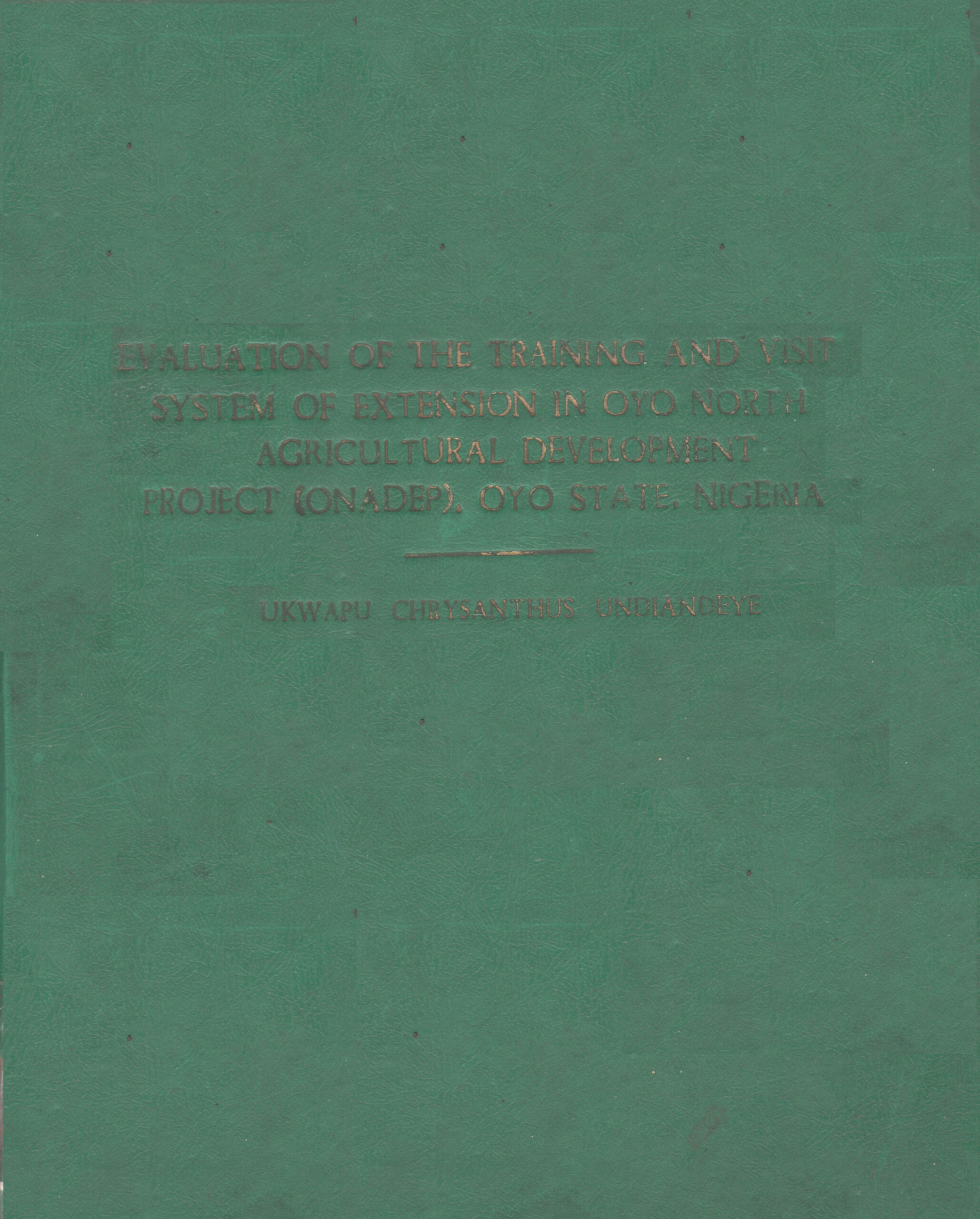Evaluation of the Training and Visit System of Extension in Oyo North Agricultural Development Project (ONADEP), Oyo State, Nigeria.
$20.00
CONTENTS
CHAPTER I – INTRODUCTION
1.1 Food Problems and Agricultural Extension Services in Nigeria
1 1.2 Statement of the Problem
1.3 Objectives of the Study
1.4 Hypotheses of the Study
1.5 limitations of the Study
1.6 Definition of Terms
CHAPTER II AGRICULTURAL EXTENSION SYSTEMS IN NIGERIA
2.1 The Ministry of Agriculture Extension System
2.2 Farm Settlement Schemes
2.3 National Accelerated Food Production Programme (NAFPP)
2.4 Operation Feed the Nation (OFN)
2.5 University Operated Extension System
2.6 The Commodity/Sectoral Agency Agricultural Extension System
2.7 Integrated Rural Development Extension System
2.8 Integrated Agricultural Development System
2.9 The Training and Visit System
CHAPTER III – CONCEPTUAL AND THEORETICAL FRAMEWORK
3.1 The concept of Agricultural Extension Evaluation
3.2 Types of Agricultural Extension Evaluation
3.3 Theoretical Orientation of the Present Study
CHAPTER IV – REVIEW OF LITERATURE
4.1 Review of Evaluation Studies on Characteristics of Farmers Reached by the T and V System
4.2 Review of Evaluation Studies on the Effectiveness of the T and V System
4.3 Review of Evaluation Studies on Obstacles to the Effectiveness of the VEW/Farmer Contact in the T and V System
4.4 Review of Evaluation Studies on the Utilization and Adequacy of Resources in the T and V System
4.5 Review of Evaluation Studies on Farmers’ Sources of Farm Information
4.6 Review of Evaluation Studies on the Effects of the T and V System
CHAPTER V – METHODOLOGY
5.1 The Study Area
5.2 Sources of Data
5.3 Development of the Instruments
5.4 Procedure for Data Collection
5.5 Sampling Technique
5.6 Measurement of Some Variables
5.7 Data Analysis Procedure
CHAPTER VI – PRESENTATION, ANALYSIS AND DISCUSSION OF MAJOR FINDINGS OF THE STUDY
6.1 Characteristics of Sample Farmers in the Study
6.2 Effectiveness of the T and V System
6.3 Obstacles to the Effectiveness of the T and V System
6.4 Utilization and Adequacy of Resources of the T and V System
6.5 Use of Sources of Information by Farmers 146 6.6 Effects of the T and V System
CHAPTER VII – SUMMARY, CONCLUSIONS AND RECOMMENDATIONS
7.1 Introduction
7.2 Objectives of the Study
7.3 Methodology
7.4 Summary of Major Findings of the Study
7.5 Conclusions 180 7.6 Recommendations
7.7 Areas for Further Research
REFERENCES
APPENDICES
Description
ABSTRACT
One of the problems militating against increased local food production in Nigeria despite her abundant natural and human resources has b6en identified as the ineffective systems of agricultural extension. One of the numerous attempts by government to increase local food production is the establishment of agricultural development projects (ADPs). An important feature of the ADPs is the use of the Training and Visit (11‘ and V) system of agricultural extension which has contributed significantly to the agricultural development of some developing countries. It was introduced into Nigeria about five years ago. There have been no attempts made to evaluate its performance in the country. The general objective of this study was to evaluate the T and V system of agricultural extension in the Oyo North Agricultural Development Project (ONADEP). An interview schedule was developed, pre-tested and administered on 264 farmers from the project area, consisting of 132 contact and 132 non-contact farmers and 140 non-project farmers. The farmers were randomly selected from all the blocks and wards of the project and non-project areas respectively. A questionnaire was also developed, pre-tested and administered on all available village extension workers in both the project and non-project areas. Secondary data were also obtained froth the project headquarters as well as the Federal Agricultural Co-ordinating Unit (FACU).
The study showed that T and V system in the project was not effective in terms of the selection of contact farmers, as most of them were elderly males, operating large farm holdings and participating actively in village organisations. The contact farmers were also not visiting non-contact farmers regularly to spread extension messages. The T and V was, however, effective in terms of the familiarity of village extension workers (VEWs) with farmers as well as the frequency and number of visits paid by the VEWs to farmers. Obstacles to the effectiveness of the T and V system in the project included the ratio of the VEWs to farmer, training of VEWs, and availability of inputs at farm service centres. The findings further showed that resources of the T and V system, such as the use of contact farmers, availability of subject-matter-specialists, the VEW to farmer ratio and input supplies were not effectively utilized by the T and V system management. The study also showed that more farmers in the project areas used personal cosmopolite and personal localite sources of farm infor’mation than non-project farmers.
The T and V system had effects on on the project farmers in terms of their knowledge and adoption of crop production recommendations and hence on their crop yields. In order to improve the effectiveness of the T and V system in the study area, it was recommended that (a) contact farmers should be more representative of other farmers, as this would help in the spread of extension messages, (b) the project management should more effectively supervise the zonal extension officers, area extension officers, subject-matter-specialists and Training officers, f,c) to ensure better performance of the VEWs, their conditions of service be improved, especially their mobility, housing and promotion policies. The use of cinema vans was recommended as these have been found very effective in the spread of extension messages. Some areas for further research were suggested.

Prof. Ukwapu Undiandeye
Ukwapu Chrysanthus Undiandeye is a Professor of Agricultural Extension that has left an indellible mark in his field. He began his scholastic journey 28 years ago with University of Maiduguri in Nigeria as a Lecturer 1.
He teaches Undergraduate and Postgraduate students in University of Calabar and several others. His wealth of wisdom has been harnessed to handle responsibilities and take up leadership positions, some of such responsibilities include Visiting Professor, Bayero University, Kano from 2009 to 2012, Head, Department of Agricultural Economics and Extension, University of Calabar, Oct. from 2014 till Date etc. He has attended several conferences within and outside Nigeria, some of which He was the lead paper presenter. Notable of such conferences is the conference on the Future of Cross River State Calabar, Cross River State, Organized by the Cross River State Ministry of Agriculture where he presented a paper on “Revitalizing the Cross River State Estate”. To his credit are 55 publications in Books, Monographs, Book Chapters. Some of them are Open Access in this knowledgebase.
Questions and Answers
You are not logged in
